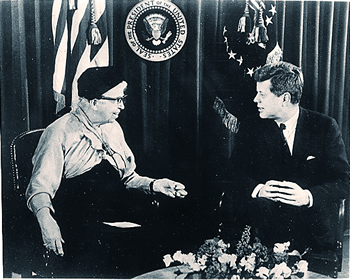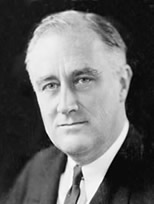This Week in History:
November 21 - 27, 1963 and 1863
The Assassination of John F. Kennedy
and Lincoln's Gettysburg Address
November 2010
 Assassination of President John F. Kennedy. |
Of the portentous events in American history which occurred in this week, the most significant by far was the assassination of President John Fitzgerald Kennedy, on Nov. 22, 1963. President Kennedy's murder, and the subsequent failure of the U.S. Establishment and population to discover and tell the truth about its real authors, was the signal event in the transformation of the United States, from being the postwar superpower with the capability, and budding commitment, to a global mission of doing good, into becoming the post-industrial, would-be imperialist wreck that it is today.
As EIR founder Lyndon LaRouche has often pointed out, President Kennedy came into office with the potential, and strong inclination, to follow in the footsteps of the only great U.S. President in the 20th century, Franklin Delano Roosevelt. While surrounded by Utopian lunatics in the military and the foreign policy establishment—including the young Henry Kissinger and McGeorge Bundy—the World War II veteran Kennedy fought energetically against the One World government, Wellsian schemes which this crew hoped to ram through, now that they had the American military commander Dwight D. Eisenhower, out of the way.
President Kennedy's boldest initiative, taken only four months after he was inaugurated, was the announcement of the manned Moon mission, a mission which threatened to unleash the best scientific and moral capacity of the United States. But that was not all. Kennedy also came to be increasingly at loggerheads with his would-be controllers in the foreign-policy arena. He nixed some of the worst proposals (like that calling for the U.S. to carry out a bombing of a U.S. aircraft that would be blamed on the Cubans, and used as an excuse for war), fired Henry Kissinger, got through the Cuban Missile Crisis without being trapped into launching World War III, and was about to make the decision to deploy out of Vietnam, despite recommendations from his military advisers to commit a massive troop deployment to the area.
For all these reasons—but, more importantly, what the accomplishment of this directionality in foreign and economy policy would mean for the role of the United States—President John Kennedy was a threat to the British-American oligarchy which was determined to control the United States.
 FDR Library Kennedy came into the Presidency largely through the efforts of Eleanor Roosevelt. Under her influence, he adopted the intention of following the policies of Franklin Roosevelt. Shown: Eleanor Roosevelt with President Kennedy, at the White House, March 1, 1961, just weeks after he took office. |
EIR's investigations over the years on the Kennedy assassination have been definitive in identifying the nexus which organized the murder, and the cover-up, of the murderers. The central institution involved was the Permindex organization, which was tied directly into circles around the British Monarchy, Prince Philip's World Wildlife Fund, and the Special Operations Executive. The tentacles of this institution extended into New Orleans (where they were investigated by District Attorney Jim Garrison), Canada (where they were represented by British intelligence agent Major Louis Mortimer Bloomfield), and Europe, where Permindex operatives were involved in the attempted assassination of French General Charles de Gaulle.
Looking behind the particulars, what is clear is that it was the high levels of British Intelligence, with its American collaborators, who were determined to get President Kennedy out of the way.
There's a long history of such British Intelligence-authored assassinations of American Presidents, ranging from Abraham Lincoln, to James Garfield, to William McKinley. In each case, the British were fearful of the threat to their financial and political control, from an emerging American republican power, led by an extraordinary leader occupying the Presidency of the United States. These oligarchical agents feared the President Kennedy would be one such leaders.
The Gettysburg Address
 Abraham Lincoln |
 Franklin Delano Roosevelt |
What Kennedy might have become, is suggested by another significant event which occurred during this week in history, specifically Nov. 19, 1863. This was the day that President Abraham Lincoln gave what has come down as the most poetic, and stirring, statement of the purpose of our Republic, the Gettysburg Address.
Speaking at the dedication of the cemetery at the Gettysburg battlefield, President Lincoln rose above the bitter partisanship of the period, to encapsulate the hopes of the nation. He spoke of all the soldiers, both Union and Confederate, and how they had dedicated the ground with their sacrifice. He asked those listening, and those millions who have read his words subsequently, to dedicate themselves to ensuring that a nation, devoted to the proposition that all men were created equal, would not perish from the Earth.
That ability to touch the soul of the nation, on a matter of profound principle, and to move people behind such a mission, was the reason the British, and their feudalist allies around the Vatican, were determined that President Lincoln would not be allowed to organize the peace, after having won the Civil War. His body was not cold, before the purposes for which he had given his all, were violently subverted.
We will never know whether President Kennedy, cut down on Nov. 22, 1963, would have exhibited the greatness of Abraham Lincoln—or even that of Lincoln's emulator, Franklin Delano Roosevelt. What we can do is to devote ourselves to ensuring that those treasonous elements—American toadies of British oligarchical thinking—are finally removed from positions of power in our nation, and we are led once more, in the tradition of republican greatness, which our people, and the world, so desperately need.
The original article was published in the EIR Online’s Electronic Intelligence Weekly, as part of an ongoing series on history, with a special emphasis on American history. We are reprinting and updating these articles now to assist our readers in understanding of the American System of Economy.
